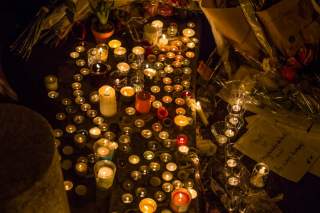The Charlie Hebdo Attack: The Double Alienation Dilemma
A deeper look at some of the possible motivations for the shocking attack in Paris that has had the world on edge.
In direct contrast to these feelings of boredom, purposelessness and insignificance, the jihadists offer redemption through the image of the chivalrous warrior, with the individual recast as some sort of avenging. Following the Charlie Hedbo attack, Islamic State's official radio station praised the “Jihadi heroes who had avenged the Prophet,” validating the Kouachi brothers’ transformation from petty criminals and nobodies into heroes of Islam. The appeal to the valiant holy warrior or chivalrous knight is a recurring theme in jihadist literature, and the Islamic State’s propaganda machine has been busy pumping out material that shrewdly seeks to exploit these tensions. Recent social-media agitprop included the telling phrases “Sometimes people with the worst pasts create the best futures” and “Why be a loser when you can be a martyr?”
Ironically, the religious illiteracy of these “religious warriors,” and shrewd employment of Islam for power and politics is perhaps best summed up by a brilliantly insightful Charlie Hebdo cartoon published last October captioned, “If Muhammad returned…”.
It portrays a masked ISIS jihadist about to behead a kneeling, bearded and turbaned victim, who protests, “I am the Prophet, you brute!”
The killer replies, “Shut your mouth, infidel!”
Religion is important to these murderers. But only because, for many, it serves as the most emphatic critique of the failed promise of the French Republic, enshrined in her motto: “Liberty, Equality and Fraternity” for all.
Akil N. Awan is Assistant Professor in Modern History, Political Violence and Terrorism at Royal Holloway, University of London. His research interests are focused around the history of terrorism, radicalization, social movements, protest, and new media. In addition, he is also Research Associate with the New Political Communication Unit, with the Centre for Public History, and the Centre for Minority Studies. Dr. Awan is regularly consulted by government bodies, think-tanks, media and other organizations in his fields of expertise, and has served in an advisory capacity to the UK Home Office, the Foreign Office, the US State Department, and the US Military amongst others. Most recently, he served as special advisor on Radicalization to the UK Parliament, and as academic expert on Genocide to the UK House of Lords delegation to Srebrenica. Follow him on Twitter:@Akil_N_Awan.
Image: Flickr/cbille/CC by-nc-sa 2.0

